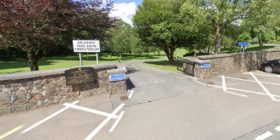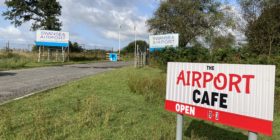Steel Is A 21st Century Industry – Swansea Research On Tomorrow’s Technologies

Steel is a 21st century industry, high-tech and highly-skilled – and it is essential for many of tomorrow’s technologies. That’s the message from Swansea University researchers who work closely with the industry, as they revealed the wide range of areas they work on: from solar energy and algae to producing steel for the next generation of cars.
The researchers highlighted the variety and scope of their work to illustrate the importance of steel for the 21st century world, as Tata Steel puts its UK operations up for sale.
The familiar image of steelmaking is of blast furnaces and chimneys. Yet the modern steel industry also requires the lab, the lecture theatre and the latest research facilities, where materials can be tested and experts trained.
This is where Swansea University and its partners have played a crucial role over the past 20 years, as part of the research infrastructure supporting the steel industry across south Wales. Indeed, the University’s links with the metal industries stretch back further, as it was founded to help meet the needs of industry in a region long famous for its expertise in metals.
Brand-new research and testing facilities at the University’s new Bay Campus, which is situated across the bay from the giant Port Talbot steelworks, will help strengthen this collaboration.
Swansea and steel – in numbers:
- 200 – approximate number of steel industry engineers trained at Swansea University via schemes like the Materials Academy
- £4 million a year – savings at the Port Talbot steel plant thanks to a new technique for stirring in the furnace
- 40 years – length of warranty Tata was able to offer on products treated with new anti-corrosion coatings developed with Swansea University

Dr Cameron Pleydell-Pearce, senior lecturer at Swansea University College of Engineering, said:
“Steel is a 21st century industry, highly-skilled and high-tech. Working with our partners in the industry, we’re using steel to help us develop tomorrow’s technologies, from lighter cars to greener buildings.
Collaboration is vital. Companies can test out their products in our labs, using the very latest equipment, and they can use our facilities for training their workforce. Many of our graduates go on to work in the industry.
The partnership between Swansea and the metals industry is a key part of the 21st century economy, contributing to the wealth of the region. “
Professor Dave Worsley, head of the SPECIFIC project, which involves Tata Steel and which is developing technology to turn buildings into power stations, said:
“Steel is essential for everything that we use – from the buildings where we live and work to the cars, buses and trains we use to get around; from the coins in our pocket to the food cans in our kitchens.
Welsh steel is of extremely high quality, which means it can be turned into lots of different products.
Innovation and technical ability is at the heart of sustainability both from an economic and environmental standpoint. People at every level in the industry and in its partner organisations are a terrific and currently untapped asset . They will deliver new products and processes leading to a sustainable industry manufacturing high technology functional products.
Strong partnerships with industry have been at the heart of Swansea University’s mission ever since its foundation in 1920. We have undertaken many pioneering activities in steel, like our Engineering Doctorate programme, which is delivering immense value through the Materials and Manufacturing Academy.
The University has had a long and fruitful association with the UK steels sector. With our unrivalled expertise and facilities – especially our new Bay Campus – we are ready to work with any prospective partners in the steel industry, to help develop tomorrow’s technologies.”

Swansea University research: 21st century steel for tomorrow’s technologies
Solar energy – turning buildings into power stations
- The SPECIFIC Project is developing coatings that enable buildings to generate, store and release their own power.
- Steel is at the heart of this project, and Tata Steel has been a partner
- Products developed include a metal cladding product with solar cells embedded in it.
Nano-precipitates – lighter and thus greener cars
- Researchers in the College of Engineering are using high-tech imaging equipment to analyse and test a new form of steel
- It could be used for the chassis of cars and would be lighter than current alternatives, improving efficiency and reducing CO2 emissions
- The material is strengthened by tiny structures which are the same length as your fingernail will grow in ten seconds
Sustainable steelmaking – using algae to absorb CO2
- College of Science researchers have set up a mobile algal laboratory at Port Talbot, in collaboration with Tata Steel
- They have shown that algae can be used for capturing some of the carbon emitted during the steelmaking process, reducing emissions into the atmosphere
The wet suit principle – cladding a building to suck in warm air
- Researchers have developed a perforated steel which sucks in air from outside and traps it
- Cladding a building in this steel means it can be heated without the need for gas
- The warm air in summer can also be stored for use in winter using a novel layered mineral product
Materials science modelling techniques make blast furnaces more efficient
- Complex discrete element modelling undertaken at Swansea University has helped predict distribution and flow of particles in a blast furnace
- This increases the efficiency of the furnace
- This has already produced data to influence the operation of the furnace at Port Talbot, cementing its position in the top quartile in the world for efficiency and quality

Spotted something? Got a story? Email News@News.Wales











